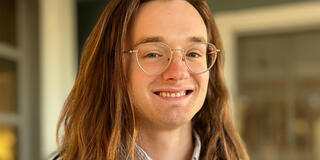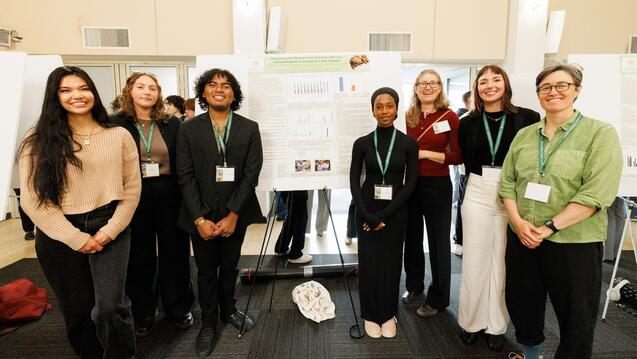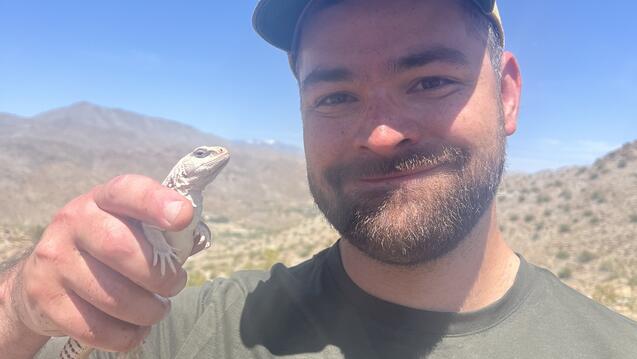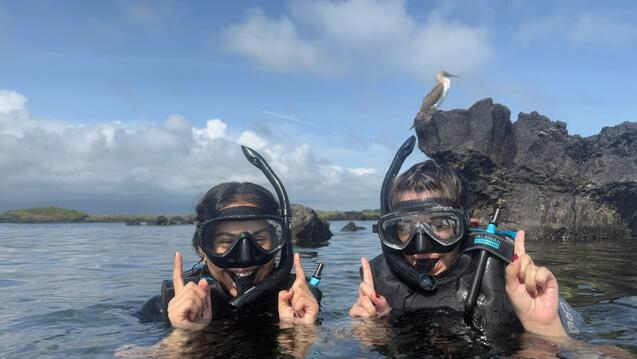Meet Skylar Knight '16

He talks about science communication, his master’s program in London, and how he is changing the world from the California Academy of Sciences.
Why USF?
I was just enamored with San Francisco, and I wasn't totally sure what I wanted to do. I knew it was related to the sciences, and I knew that USF, and San Francisco more broadly, was sort of a hub for biotech, for science, for medicine, and all these different fields that I thought I wanted to go into. And so, I wanted to start in a place that had all of that to offer.
Why did you choose to study biology?
Like a lot of biology students, especially in undergrad, I thought I wanted to pursue medicine and go the med school route. And in part because of my experiences at USF, but also some of my experiences post-graduation, I realized that's not what I wanted to do, and so I changed trajectories about a year out of graduation.
What did you like about majoring in bio?
I love the sciences. I find it really fascinating getting to explore how the body works and how animals work in nature. It's just exciting. It's sort of a detective novel that's ever unfolding. I think for USF in particular, one thing that I loved throughout my time there was lab work. It was very hands-on. With most of my upper division courses, there was some sort of lab component that really got me learning a lot of practical skills. And for me in particular, it actually showed me that lab work was not my passion, but I wouldn't have known that otherwise. I would have graduated, probably gotten a job in a lab. But being exposed to that early on helped me kind of define and understand what I enjoyed about science.
What did you study in graduate school?
I did a master's program at Imperial College London, where I studied science communication. Some of it was the science of science communication: what kind of messaging works best to get people energized about climate change as opposed to depressed about it. What forms of communication work best for presentations to help scientific information sink in, that kind of stuff. And the other half was practical. So radio production, film production, writing, article writing, things like that.
What kind of work are you doing at the California Academy of Sciences?
So my job, like my graduate school program, is pretty interdisciplinary. My job is split 50/50, half of it is working at the California Academy of Sciences doing science communication. So in addition to the museum that everybody loves — and I'm sure many USF students have been to — it’s also home to the institute for Biodiversity Science and Sustainability. We have over 100 researchers around the world. We have a couple dozen pretty high-level researchers who are producing scientific papers describing new species, or describing range changes, or using our museum collection to better understand life on earth and how it's changing in the face of things like climate change and biodiversity loss. And so half of my job is supporting them by writing press releases for their scientific research, pitching stories to journalists at The New York Times, the Guardian, LA Times, places like that, doing media training so they feel comfortable talking to press and talking about their research, and then helping to produce videos and other media for their science communication efforts.
And then the other half of my job is that the academy financially supports an editorially independent magazine called Biographic. It's an online magazine that's dedicated to biodiversity science. It's really visual. All of our stories really have three key requirements: they have to be visually quite striking; they have to be a solution story, so it has to be optimistic; and they have to be focused on biodiversity. And so, I'm managing editor for that, which includes some writing, but also shuttling stories through the production process, working with freelance writers and photographers.
What is your favorite aspect of your job?
It's diverse. Every single day I get to work with an incredible array of scientists who are personally diverse. Their expertise is diverse. The species that they work on are diverse. And so every single day, I get to learn something new. One day I'll be writing a press release about fish that live in the mesophotic zone, which is kind of a middle ground, deep sea environment. And then the next day, I'm writing about a new spider species that was discovered in California.
Did your USF degree or any of your classes prepare you for this role?
Yeah, they absolutely did, in a lot of tangible ways. They prepared me for reading scientific information, so I would not be nearly as successful at what I do and probably not enjoy it as much if I wasn't able to talk to the scientists in their own language, so to speak. A lot of my work is translating what they're saying into something that's more interesting for the public. But in order to do that really well and to not sensationalize and overstate the research that they're doing, it helps to be able to understand and speak their language when I'm with them. And so, the only way I know how to speak that language is because of all the information that I learned at USF. Because we had incredible instructors who taught us how to read scientific papers, taught us the importance of digesting it and communicating it in plain English language.
And then a softer skill would just be critical thinking. I mean, the biology program, particularly the final class that we take, Evolution with Dr. Sikes, is a lot about not taking things in science for granted, for looking at it really critically and teasing out important questions.
And that applies to science communication as well. So when I'm with a researcher, even though I trust their knowledge and I'm relying on them as the expert, I also know how to look at the paper critically and ask questions that I think an audience or a layperson might be interested in, which helps pull out those more compelling stories and anecdotes.
Has the creative side of your work always been an interest to you?
To be honest, it hasn't been. So from when I was really young, my parents kind of beat the doctor drum and pushed me towards the sciences, sometimes at the expense of pursuing more creative outlets. And so that was something that was hard for me.
I did love that at USF, even in the sciences, you were encouraged to write, and even if it's a lab report, it's still getting words on paper, which is ultimately a creative output, even if it feels a bit formulaic at times. And also, USF as an institution encourages you to be interdisciplinary. It encourages you, and in some ways forces you through course requirements, to take things that aren't necessarily related to your major track. And that can be really inspiring. I mean, I took all kinds of courses of varying degrees of applicability to what I ended up doing, but it opened my eyes to a lot more than the blinders that I was wearing just going down the medical school route.
The more I jump into it, the more I love having that creative output, and I wish I pursued it more in undergrad, because just knowing my teachers, I know that they would have encouraged it and found ways to tie that into the work I was doing in the biology program.
Is there anything you wish you would have known as you were job searching?
One thing that would have been nice to know, and it's still something to remind yourself is: realistically, you're going to have a lot of jobs in your life. And so whatever you end up doing or pursuing, it can be as temporary or as long term as you want it to be, as long as you're willing to put in the work for it. So I wish I would have been more flexible. To some degree, I did this, but I don't think every student does, which is if you see something that kind of interests you and maybe it doesn't feel like it's a checkbox on the way to what you think you want to do, if there's interest there, go ahead and pursue it. It doesn't have to be permanent, and it can all shape what you end up doing in the long term.
What sort of impact do you hope your work will have on the biology field?
I know a mission statement can be cheesy and grandiose, but the Academy's mission statement — which is to regenerate the natural world — is possible with the experts that we have. So really what I hope to do is either through my writing for Biographic or through the stories that I help produce for Biographic or the science that I help communicate and translate from our researchers, I hope that I convince people that we live in a beautiful, really diverse planet and inspire people to actually want to go out and protect it. And that can mean however is best for them ultimately. I want to use words in science communication as a force for good, to get people interested and engaged and out in nature.


